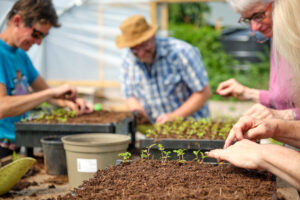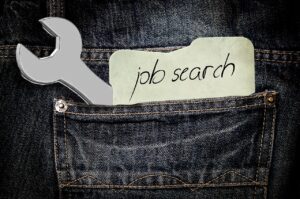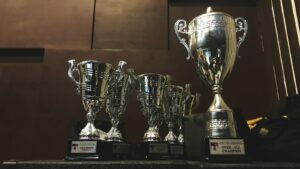The business of recycling
Over the past year, the so-called Blue Planet effect has generated a huge public interest in plastic waste and recycling. NewStart spoke to three businesses who have turned what’s old into new and recycled their way to profits.
Harsha Rathnayake is a self-styled ‘trash tycoon’, who owns Junk Hunters, an environmental waste collection service.
When I started my company I saw a gap in the market. It’s an industry with a low barrier of entry so there was lots of competition, but most people are in white vans or they’re unbranded companies going around collecting rubbish such as scrap men.
Then some of these people go around fly-tipping and this rubbish ends up somewhere it shouldn’t be. My aim was to create a company with branded trucks and uniform and build a reputation as a firm who recycles and disposes of the rubbish in an environmentally friendly manner.
Rubbish is a neverending industry. Councils are very picky about what they collect. If it’s too big for the bin then people sometimes have no choice to look for a company like us.
We’ve collected statues in the past that were worth £2800 pound each, lying in someones back garden. We found Apple Macs and Louis Vuitton handbags, people have dreams of owning these things but to some people its just junk.
It doesn’t matter if councils put cameras everywhere, fly tipping is happening on private land. Groups are unlocking padlocks and they’re getting in. Then the next day someone will fill it with rubbish.
I started in 2009 with one truck in London. We now have 8 trucks in London and are expanding across the UK. I’m in Birmingham where a franchisee launched yesterday. I’m here to give him guidance.
Landfill tax is increasing every year, we have no choice to recycle more and more and people are trying.
We work in partnership with waste transfer stations who separate the materials and send it to recycling facilities, 80% of the waste we collect is recycled.
However, recycling is still very confusing for people. If there is a national colour code then that will help a lot. Harrow Council has brown bins for green waste, whereas Brent has green bins for green waste. That would make things a lot easier for people. People are doing their bit to recycle but it needs to be standard regardless of where you live.
Guy Schooling is the chairman of Sworders, a fine art and antiques auctioneer that has been in business since the 18th century. They are proud of their recycling credentials, and are celebrating 10 years of their pioneering straw bale auction house in Essex.

For a long time, we had the largest straw bale building in Europe. We chose it for two reasons. We felt we needed to do something imaginative as we think we are a recycling business so it made perfect sense. It took a year to build it but five years to get planning consent.
The planners objected to everything you could possibly imagine. The chief planning officer said you will get consent on that building ‘over my dead body!’
So we had to be very sure about what we were doing. The bonus was it was on a brownfield site, and it was never reinstated after previously being a quarry. We needed to put a cast iron case together. We took an enormous amount of advice.
It took a long time. We built it in a year, then three years later we increased the size by 50%.
It would be easier today. Environmentally, people are much more aware.
The straw building is thermal and acoustically it’s very good for our auctions, it left less of a footprint during building because the foundations are shallower and the walls are not as heavy.
There’s no fire risk, the straw bales are densely compact and we lowered the roof onto the straw bales to compress them further, then we applied four layers of line render directly onto straw bales. There is no way a spark can get in, if it does, it will be starved of oxygen.
It was built for a purpose and we are fulfilling that purpose. Two or three times a year people ring us, out of the blue, and say can we look at it, and we enjoy showing them around.
In the art world, there will always be a lot of movement of goods because that’s what we’re involved with, but everything we sell is being recycled, it’s going from somebody who no longer has a need for it, and it’s going somewhere where it’s going to be cherished all over again. How good is that?
Jane Sutton represents Eco Furnitures, an Ipswich-based social enterprise that employs people with mental health issues to make furniture out of recycled plastic waste.
 About six years ago we were a selection of services that were part of Suffolk County Council, which included adult learning, employment support and then we had six social businesses.
About six years ago we were a selection of services that were part of Suffolk County Council, which included adult learning, employment support and then we had six social businesses.
Then Suffolk County Council decided to divest out more of their services and become commissioners. We thought setting up a business ourselves privately would be a good idea and would work, and six years later we’re still here.
Our main ethos is supporting people with disabilities into employment, reskilling them, and sometimes signposting them on to mainstream employment. We offer them skills like woodwork in a factory setting.
Our staff have all sorts of mental health issues, the more we sell of the product then the more opportunities they have. We employ 330 people and 30% have a declared disability.
We don’t do the recycling on site. A plant gets the bottles, carrier bags, CD cases, and compresses and melts them down so it looks like shredded paper. It’s then compacted into planks, then we buy the plastic planks in and make our furniture.
It’s a lot more expensive than wood because it doesn’t rot and you don’t have to treat it. It’s very heavy duty and a lot of our furniture is sold to places of interest such as Colchester Zoo, or benches for councils, national trusts and schools.
We all get bored with designs and if someone decides they don’t want their furniture anymore, our customers can give us a call and we’ll take it apart, it’s sent back to the manufacturer and it’s reused again.
I think the David Attenborough effect has made people more interested in recycling, but it’s expensive. It’s like wanting to buy organic food but the price doubles, all things that are good costs more!
We’re part of the circular economy and there’s a knock on effect. The more disabled people we employ, the better they are feeling about themselves and the less likely they will be visiting their GP which might put pressure on the health service.
We tailor the jobs to suit their needs. Somebody might only be able to do 10 hours and that’s fine, so we’ll work out what hours that suit them so they can come to work and get paid.















